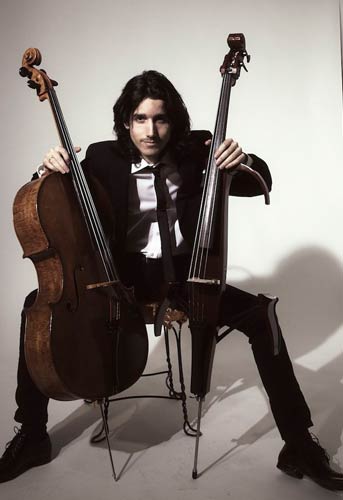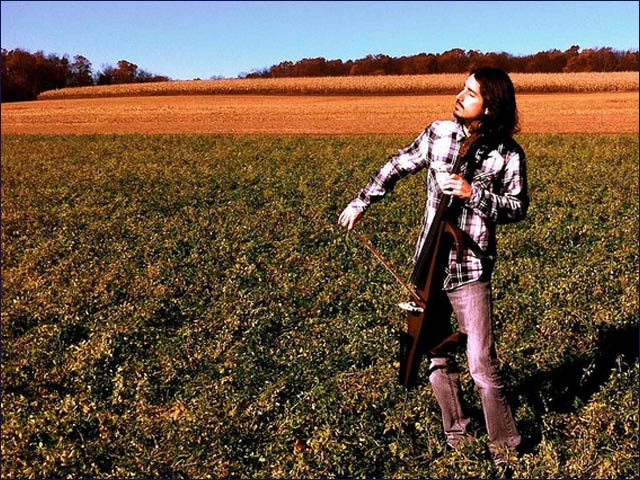By Avigayil Kadesh
It’s hard to catch Yoed Nir at home in New York City. The Israeli cellist is nearly always on the road or in the recording studio. He has provided accompaniment on some 450 albums – most recently, Judy Collins’ “Bohemian.” He can be seen onstage in a Public Broadcasting System show with Collins filmed at the Metropolitan Museum of Art.
We spoke with him by phone in Barcelona during his month-long, multicity European tour with Regina Spektor. Before embarking on that summer journey, they played the opening act for Tom Petty and the Heartbreakers for three weeks in the United States.
“Next we’ll perform a tour on the [US] West Coast, finishing with an appearance on Jay Leno,” Nir says.
Born in 1980, Nir grew up in Ganei Tikvah, a leafy Israeli town that happens to have what he calls “a great conservatory” then headed by Leonid Rosenberg, now director of the annual Eilat Chamber Music Festival.
“My father took me there when I was seven and introduced me to a cello teacher, Ma’ayan Matityahu.”
Like his siblings, little Yoed was encouraged to choose an instrument to study. He felt instantly drawn to the cello. “The teacher played me a few tunes and I fell in love with the sound,” he recalls. Matityahu trained him in classic cello, initially using a smaller instrument built for kids.
Later she took him to “Stricker,” the Israeli Conservatory of Music on Stricker Street in Tel Aviv. Following high school, he played for soldiers all around the country as part of the IDF’s string quartet. He took first prize at the 2002 International String Competition in the Czech Republic, graduated from the Jerusalem Music Academy in 2005 and began performing throughout Israel and Europe, most notably with the Israel Philharmonic Orchestra in 2007. Later that year, he moved to Manhattan.
“In Israel, I did a lot of recording and played with a lot of different artists -- most of the major artists in Israel -- on many albums. I decided I can always go back, but I had a dream to move out and explore possibilities other places can offer, especially New York,” he explains.

Yoed Nir and his two cellos, a classic August Diehl and an electric Yamaha
“I’m classically trained and I still do that, but New York is a great place to play world music, jazz, pop, rock ... everything. I have developed as a musician in many ways. I just recorded and arranged all the string parts from one cello -- high cello and low cello to create a full chamber orchestra -- something I am doing a lot in the past three years in my home recording studio in Manhattan.”
He shares that home (and sometimes the recital stage, too) with his wife, Anat Nir, an Israeli classical pianist and singer-songwriter now working on her first solo album to be released next year in Israel. They met through Yoed’s Jerusalem Music Academy cello professor, David Sela, who had been Anat’s music teacher in high school.
Digs bossa nova
The sounds of Nir’s cello are heard on hundreds of albums recorded by such renowned performers as Judy Collins, Paul Banks, Regina Spektor, Rufus Wainwright, Diane Birch, Sonya Kitchell, Shawn Colvin and the Israeli singer Yael Naim, for whom he arranged and overdubbed all the string parts on her two most recent albums, the first of which received a 2008 Best World Music Album in France.
His versatility is due to his talent, no doubt, but also to his early exposure to the diverse styles of music in his homeland.
“I think growing up in Israel gave me a mixture of all the musical cultures, and that absolutely gives me the advantage of exploring other fields in music,” he says. “My favorite genre in the last few years is Brazilian music -- bossa nova, Gilberto Gil – it’s very melodic. I certainly hope to play with these artists in the near future.”
His “old love,” however, remains ’70s and ’80s Israeli music by the likes of Shlomo Gronich, Matti Caspi, Arik Einstein and Shlomo Artzi. In fact, Nir’s cello can be heard on Einstein’s last two albums, and he’s also recorded with Artzi.
He also does solo appearances, the most recent of which was in the Rose Theatre at New York’s Lincoln Center.
Nir uses two cellos – an electric Custom Yamaha SVC-210 and a classic August Diehl model on loan from the America-Israel Cultural Foundation.
“It took me a long time to choose an electric instrument, and I realized after a long search that the specific model I am playing now is best for me,” he explains. “Electric string instruments usually are not so good, but the Yamaha models are quite similar to the original sound of the cello, especially in shows where the cello has to penetrate the sound of the other instruments on the stage.”

Taking his Yamaha electric cello into nature
The stages he graces are prestigious ones, including New York’s Beacon Theatre, Radio City Music Hall, Carnegie Hall, Alice Tully Hall and Merkin Concert Hall; the Kodak Theatre, Greek Theatre and El-Rey Theatre in Los Angeles; and San Francisco’s Great American Music Hall.
At least twice a year, he visits his family in Israel, though he has not publicly performed in his homeland since 2007. “My family supports me,” he says. “They miss me a lot, but they know I am going with my heart.”